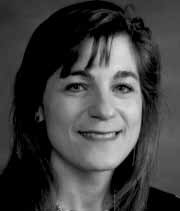
by Daniel McCabe
 |
| Dr. Patricia Dobkin |
A McGill undergraduate in the early 1980s, Patricia Dobkin remembers putting up with classes crammed with too many students, classes that offered little interaction with the professor teaching the course. "I sympathize with the students who complain about that sort of thing today. I didn't much like it either."
That's why Dr. Dobkin, an assistant professor in the Department of Medicine, was quick to volunteer to teach one of McGill's new first-year seminar courses. Offered by the Faculties of Arts and Science to new McGill students, the first-year seminars aim to make the transition to university life easier for students who are fresh out of high school or CEGEP--students who sometimes have difficulty coping with the more demanding work load they face at McGill.
Sixteen first-year seminars are being offered to frosh. The courses will all feature low enrolments-no more than 20 students will be allowed into each. The seminars are intended to give unseasoned undergraduates close access to professors and a taste of what university scholarship is all about.
"The professors in charge of these courses will be teaching their students sound academic skills," says English professor Sarah Westphal, the associate dean of arts. "Students will be taught how to articulate and defend their views, for instance. Instead of doing an overview of a field of study, the professors and their students might take an unsolved problem in the field and take a fresh look at it."
Westphal was responsible for organizing the first set of arts seminars. "I'm excited. Some of the best teachers in this faculty took up the challenge," she says. "We want to introduce first-year students to some of the most exciting research going on in their fields. We'll be linking novice students with rather advanced research techniques."
For example, instead of reading about an medieval manuscript in a textbook, Westphal says students in these courses might be asked to analyze the ancient tract for themselves. A first-year science seminar in geography taught by Professor Wayne Pollard will use field trips to give students a sense of the contrasting landscapes and uses of land in different regions of southern Quebec.
Westphal's counterpart in the Faculty of Science, physics professor Nicholas de Takacsy, oversaw the creation of the first-year science seminars. As in the Faculty of Arts, the science seminars possess a strong interdisciplinary flavour. "The courses are anchored in a particular discipline-chemistry or computer science, for instance," says de Takacsy. "But they encourage the students taking them to look at how that discipline interacts with others. In some cases, the courses examine the way a discipline looks at the world--what does it mean to be a computer scientist? How are computer scientists unique in how they approach a question?"
De Takacsy gives the science professors who are teaching first-year seminars full credit for creating their courses. "My job was to try to remove any administrative obstacles from their path. Thankfully, we've had some talented faculty think about these seminars and conclude, 'This could be fun.'" Professor Janet Donald from the Centre for University Teaching and Learning has been busy helping some of the professors design their courses.
Although the seminars are intended to help students learn how to deal with university, de Takacsy warns students against assuming that the seminars will be 'bird courses' offering easy grades. "The seminars are going to be very demanding and the students will be expected to work hard."
The creation of the seminars was largely championed by students, most notably by a psychology student named Eric Hoffstein. Similar sorts of courses are offered at other universities--Toronto and Guelph, for instance--and they've been successful. McGill will be offering the seminars for the next five years as a pilot project. If the courses do well, they'll become a permanent fixture. Arts and Science were the two first faculties to get involved, but other faculties will likely be offering first-year seminars next year.
Dobkin's course, which will look at how health is influenced by biological, psychological and social factors, will begin in January. "Ideally, this is the way teaching should be," says Dobkin of the seminars. "It's much more interesting for a professor to teach students who are involved and stimulated.
"I don't believe much in memorization," says Dobkin. "I think we have to teach students how to learn for themselves--how to use the Internet or the libraries, for example. These seminars could be a perfect way to do that."
Don McGowan, the Students' Society's vice-president (university affairs), thinks the courses will generate a lot of interest among students. "In high school, you're used to more individualized instruction, so it's jarring when you arrive at university and you need binoculars to spot the professor teaching your course. It fosters an 'I am my student number' sense of how you're valued as a student. Students are going to be quite enthusiastic about these seminars."
De Takacsy cautions that the seminars are the first offerings of a five-year experiment. "I would be surprised if there weren't a few bugs to be worked out." Adds Westphal, "I'm hoping the experience will speak for itself, and that the people involved will be all be so pleased that the continuation of the seminars will be self-evident."
Students interested in taking a first year seminar course can register on a first-come, first-served basis through MARS. The seminars are open only to students in their first year of study at McGill and students may take only one seminar.